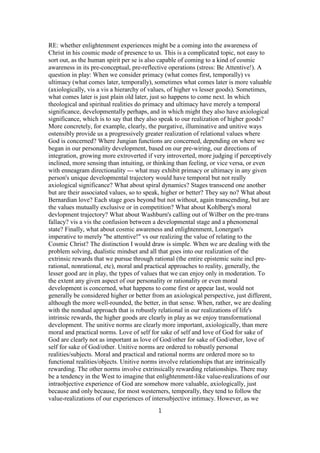
Enlightenment Experiences and the Awareness of Christ's Cosmic Presence
- 1. RE: whether enlightenment experiences might be a coming into the awareness of Christ in his cosmic mode of presence to us. This is a complicated topic, not easy to sort out, as the human spirit per se is also capable of coming to a kind of cosmic awareness in its pre-conceptual, pre-reflective operations (stress: Be Attentive!). A question in play: When we consider primacy (what comes first, temporally) vs ultimacy (what comes later, temporally), sometimes what comes later is more valuable (axiologically, vis a vis a hierarchy of values, of higher vs lesser goods). Sometimes, what comes later is just plain old later, just so happens to come next. In which theological and spiritual realities do primacy and ultimacy have merely a temporal significance, developmentally perhaps, and in which might they also have axiological significance, which is to say that they also speak to our realization of higher goods? More concretely, for example, clearly, the purgative, illuminative and unitive ways ostensibly provide us a progressively greater realization of relational values where God is concerned? Where Jungian functions are concerned, depending on where we began in our personality development, based on our pre-wiring, our directions of integration, growing more extroverted if very introverted, more judging if perceptively inclined, more sensing than intuiting, or thinking than feeling, or vice versa, or even with enneagram directionality --- what may exhibit primacy or ultimacy in any given person's unique developmental trajectory would have temporal but not really axiological significance? What about spiral dynamics? Stages transcend one another but are their associated values, so to speak, higher or better? They say no? What about Bernardian love? Each stage goes beyond but not without, again transcending, but are the values mutually exclusive or in competition? What about Kohlberg's moral devlopment trajectory? What about Washburn's calling out of Wilber on the pre-trans fallacy? vis a vis the confusion between a developmental stage and a phenomenal state? Finally, what about cosmic awareness and enlightenment, Lonergan's imperative to merely "be attentive!" vs our realizing the value of relating to the Cosmic Christ? The distinction I would draw is simple. When we are dealing with the problem solving, dualistic mindset and all that goes into our realization of the extrinsic rewards that we pursue through rational (the entire epistemic suite incl prerational, nonrational, etc), moral and practical approaches to reality, generally, the lesser good are in play, the types of values that we can enjoy only in moderation. To the extent any given aspect of our personality or rationality or even moral development is concerned, what happens to come first or appear last, would not generally be considered higher or better from an axiological perspective, just different, although the more well-rounded, the better, in that sense. When, rather, we are dealing with the nondual approach that is robustly relational in our realizations of life's intrinsic rewards, the higher goods are clearly in play as we enjoy transformational development. The unitive norms are clearly more important, axiologically, than mere moral and practical norms. Love of self for sake of self and love of God for sake of God are clearly not as important as love of God/other for sake of God/other, love of self for sake of God/other. Unitive norms are ordered to robustly personal realities/subjects. Moral and practical and rational norms are ordered more so to functional realities/objects. Unitive norms involve relationships that are intrinsically rewarding. The other norms involve extrinsically rewarding relationships. There may be a tendency in the West to imagine that enlightenment-like value-realizations of our intraobjective experience of God are somehow more valuable, axiologically, just because and only because, for most westerners, temporally, they tend to follow the value-realizations of our experiences of intersubjective intimacy. However, as we 1
- 2. consider the accounts of the East and our own value-realizations that emerge from our engagement of its praxes, we might instead inquire who, what, when, where, how and why robustly unitive norms (nondual) are being followed and intrinsic rewards and intersubjective intimacy realized versus merely rational/moral/practical norms (dualistic), extrinsic rewards and intraobjective identity. The former DO represent higher goods, the latter lesser. This is a critique of any religion, or practitioner more so, East or West. Relationality, interpersonal, matters supremely. It is not transcended by impersonal encounters, which just so happen to come later for many. Optimally, we will realize as much truth, beauty, goodness and love as possible, and so I highly value my kundalini & enlightenment experiences and intraobjective intuitions but, at the same time, I feel very strongly that the devotional strands of all religions, West and East, have found the better part. Apophasis is but a moment in service of our unitive value-realizations and not some axiological destination all its own. That we may draw a distinction between primary and secondary beatitude in the next life, relating to God and to others, does not also present a dichotomy such that we have to choose because both involve intrinsic, unitive values :) and there will be no norms in play b/c they won't be needed. All that just to say that any "awareness of Christ in his cosmic mode of presence " needs further nuance but if I am right in categorizing it vis a vis my intraobjective identity scheme, it doesn't strike me as robustly unitive and relational if not coupled with devotional, kataphatic modalities. The Jewish God, by virtue of being more functional and a moral and metaphysical force fares no better, even if it is kataphatic, even when it references Emmanuel, mostly functionally, as savior. We don't get robustly relational and intimate until Jesus & Abba. Some in the East may anticipate this Reality in their devotions? But I haven't studied that far. Christology, then, is normative, and universally so? If not, why bother? 2
